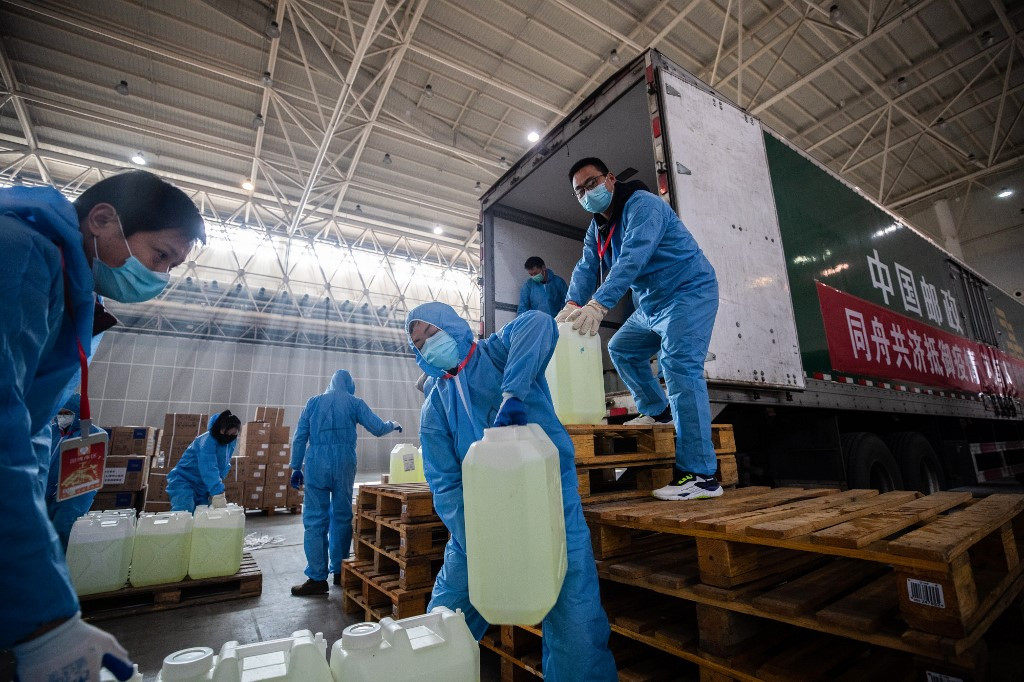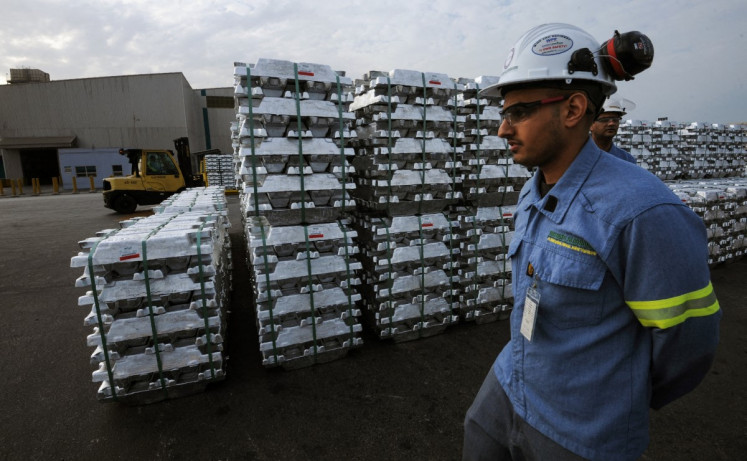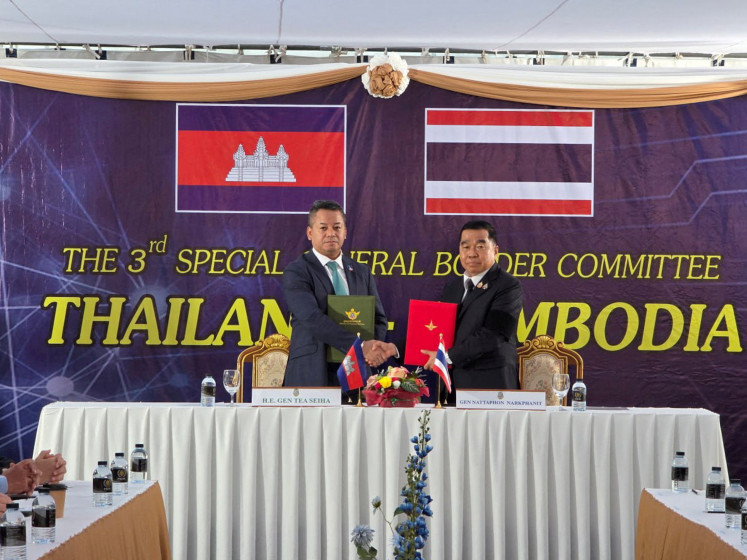Popular Reads
Top Results
Can't find what you're looking for?
View all search resultsPopular Reads
Top Results
Can't find what you're looking for?
View all search resultsCOVID-19: An ordeal for globalization
Now, when world trade has grown so deeply interdependent, the pandemic has exploded. The result is obvious: states are becoming more protectionist and nationalistic, disrupting the global supply chain. The pandemic is testing the resilience of globalization.
Change text size
Gift Premium Articles
to Anyone
 This photo taken on February 4, 2020 shows staff members and and volunteers wearing protective face masks transferring medical supplies at a warehouse of an exhibition centre which has been converted into a makeshift hospital in Wuhan, the epicentre of the new coronavirus outbreak, in China's central Hubei province. (AFP/STR)
This photo taken on February 4, 2020 shows staff members and and volunteers wearing protective face masks transferring medical supplies at a warehouse of an exhibition centre which has been converted into a makeshift hospital in Wuhan, the epicentre of the new coronavirus outbreak, in China's central Hubei province. (AFP/STR)
T
he world faces two interesting phenomena in relation to the pandemic and globalization: the rapid spread of the virus on a global scale and the disruption of the global supply chain.
Globalization accelerates the movement of goods, services and people. However, it is also as a result of globalization that the coronavirus has spread easily across the world in a matter of days.
Globalization is often blamed. When the global supply chain is disrupted because countries are withholding exports of medical equipment to meet domestic needs, globalization is deemed the culprit.
Criticism of globalization is not limited to disruptions of world trade. More seriously, globalization, during this pandemic, has been accused of changing the rule-based world trade order.
There is no single explanation for globalization. However, bearing in mind the spectrum of explanations for globalization offered by academics, globalization can be understood through two concepts: as a “process” and as an “order”.
First, as a process, globalization is recognized as a change in the way countries interact in all aspects of life because of technological advancement. The movement of goods, services and people accelerates thanks to transportation technology.
Today the movement is even faster and more massive due to the development of digital technology in the fields of communication and information. The volume of global trade has increased, accompanied by changes in the international political arena.
The end of the Cold War in the early 1990s dragged the former socialist-communist countries (the Soviet Union and the states of Eastern Europe) into the global trade system. When China officially joined the World Trade Organization (WTO) in 2001, the globalization process, both in speed and volume, accelerated further.
And now, when world trade has grown so deeply interdependent, the pandemic has exploded. The result is obvious: states are becoming more protectionist and nationalistic, disrupting the global supply chain. The pandemic is testing the resilience of globalization.
However, the disruptions caused by the pandemic will not stop globalization. Globalization as a process continues to move in proportion to technological progress and human imagination. As long as human imagination continues to develop and is manifested in civilization, globalization will not end.
Second, globalization as an order is a system that regulates international trade based on the rule of law. There are concerns that the ongoing pandemic could change the world trade order because states could become more protectionist and nationalistic in their trade policy.
The principle of open trade has clearly been harmed. Since no country is well prepared for the pandemic, many have prohibited the export of medical devices so they can meet domestic needs. The New York Times reported on March 13 that 75 countries had imposed restrictions on the export of medical devices, including the United States, the European Union, India, China and Turkey. Food exports have also been restricted.
International trade is regulated by the General Agreement on Tariffs and Trade — WTO (GATT-WTO) regime. Regarding the export bans, Article 11.1 of the GATT-WTO prohibits restrictive trade policies. However, like in any agreement, there are always exceptions.
Article 11.2 stipulates that an export restriction is allowed as long as it is applied temporarily to prevent or overcome critical deficiencies in food or other essential products. Article 21 allows export restrictions to protect security interests related to war and emergencies.
From the two articles, it is clear that prohibiting the export of medical devices, drugs and food does not violate international trade rules. It is legally justified because during this pandemic almost every country is falling short of medical equipment. Also, many countries have declared states of emergency requiring extraordinary policies.
The coronavirus has indeed forced states to pursue extraordinary policies, and international trade is no exception. In this chaotic atmosphere, it is understandable that some countries would deem it necessary to ban exports.
But while it is true that such action runs contrary to the very principle of open international trade and the spirit of globalization, it is equally true that the export bans are not prohibited in international trade.
At the same time, export restrictions need not necessarily negate the possibility of cooperation between countries in combating the pandemic. Indonesian COVID-19 diplomacy focuses on cooperating with other countries to procure the medical devices and medicines so urgently needed.
On a bilateral level, several countries have sent medical equipment to Indonesia. Indonesia has also received help from several international organizations.
At the regional level, Indonesia has called on ASEAN Plus Three leaders to strengthen coordination, including in the procurement of medical devices and medicines, to bolster the regional response to COVID-19 and mitigate its socioeconomic impact on the region.
In fact, there are many ways for Indonesia to fortify cooperation among ASEAN members. During the health crisis, though, Indonesia is opting to encourage ASEAN members to coordinate their policies regarding medical device procurement to ensure a social safety net for people and prevent social disruption and instability.
Procurement coordination must be prioritized to ensure that temporary restrictions on the movement of people do not restrict trade within the region. It is equally imperative that medical devices and food be effectively distributed to the needy. These initiatives are the real implementation of down-to-earth diplomacy — diplomacy that brings tangible benefits to the people.
Coordination in procurement will help minimize the risk of unnecessary trade disruption and preserve the sustainability of regional supply chains.
***
Senior Indonesian diplomat assigned to Austria and the United Nations in Vienna, lecturer in the postgraduate program at the International Relations Department of Padjadjaran University, Bandung









